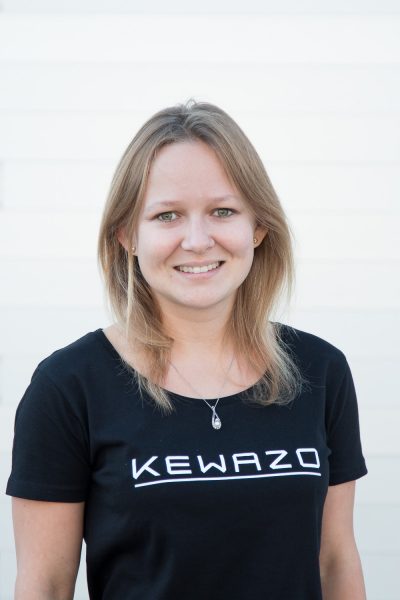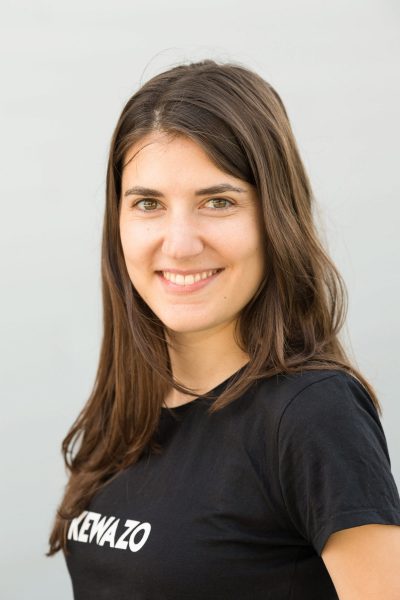Munich Startup: How did you end up starting Kewazo with such a large team? What advantages or disadvantages have you experienced in your large, diverse team?
Ekaterina Grib: The Kewazo vision is to become a leading company in the field of construction robotics. The development of intelligent robotic systems requires a great deal of knowledge and experience in many different fields. That means to make our vision reality, we need a strong and diverse team that brings together knowledge of civil engineering, construction robotics, automation, software and business. We firmly believe that innovation and creativity are promoted by a multicultural and diverse environment.
Founding to generate impact
Munich Startup: What motivated you personally to found a company?
Eirini Psallida: From the very beginning, we felt confident as a strong, unique team. The fantastic relationship we have with each other was the main motivation for me to continue with this project, which became a company after ‘Think.Make.Start’ (an interdisciplinary course at UnternehmerTUM). When you start a company, the most valuable strengths that you have are a strong team that supports you, as well as your own passion and enthusiasm. At the moment, I can’t imagine doing anything else.
Ekaterina Grib: Ever since my first serious job, I always knew I wanted to have my own company. But my thoughts were geared more towards conventional businesses and startups were never on my agenda. It was at TUM that I first heard inspiring presentations by other entrepreneurs who had just completed their studies but were already fighting for a spot for their companies in the market. Their stories and passion brought me to UnternehmerTUM, where my startup career began: My first startup project failed after six months. But our second project was a success. What still motivates me the most is impact: the impact for our conservative industry and the hard-working users, the impact for the Kewazo team and the impact for me in terms of personal growth and learning.
Munich Startup: Did you have role models when starting the company?
Eirini Psallida: I would say that starting a company came somewhat unexpected in my life. I met the right people at the right time. So I didn’t really have role models. But now as I dive deeper into the entrepreneurial world, I’m going to try to learn even more from founders who have values similar to mine.
Ekaterina Grib: I never had a set role model before founding the company, but was inspired by my co-founders, the creative environment of UnternehmerTUM and its interesting founders who I’ve met at networking events and talks. Now I would say Demet Suzan Mutlu – the founder and CEO of Trendyol. She built her fashion empire on her own. Her mental strength and determination are truly inspiring.
When faced with challenges: Look for a shortcut!
Munich Startup: When and where do you have the best ideas?
Ekaterina Grib: While talking with my co-founders, but also by learning from experts, books, articles and other entrepreneurs. A lot of the challenges that we’re going through right now aren’t unique – every startup has gone through similar phases and experienced similar problems. My advice: You have to always look for a shortcut. Entrepreneurship is about preparing a delicious meal with the few resources you have available. But it’s also usually the case that at least one other person has already made the same recipe. You just have to learn from that person and find your own path.
Munich Startup: What’s your biggest talent?
Eirini Psallida: I think my biggest talent is the ability to adapt and to work under pressure. As a founder, you often have to be open to dealing with rapid changes and remain open-minded. And at the same time, you have to learn how to quickly implement ideas while under major pressure.
Munich Startup: What’s the biggest mistake you’ve ever made?
Ekaterina Grib: One of the biggest mistakes that I’ve often been confronted with is underestimating the amount of work and deadlines. As a founder, I often try to cover several areas, and that often comes at a price. We’re all still in an on-going learning process. That is definitely also one of the biggest advantages of a startup.
Kewazo is overcoming prejudice in the construction industry
Munich Startup: What are the three most offensive prejudices you’ve encountered while starting a company?
Eirini Psallida: Our experience at Kewazo might be a bit severe, but we did decide to found a startup in the construction industry after all. Over the years, I’ve heard many prejudices from customers, suppliers or also existing competitors. I would summarize the top three as follows:
- Technologie and leadership: Men are better leaders and more talented in technology.
- Young women in the construction industry: Our customers and users are 99.9 percent men and are generally much older and more experienced than we are. Even though we noticed some prejudice in the beginning, we’ve been able to hold our own and now feel we’re on equal footing.
- Women’s careers: Women would rather concentrate on their personal lives than their careers at a certain point in life. It’s too bad that so many people still think that way and that the public image of women is still pigeonholed to such an extent.
Munich Startup: Do you think now is a good time to start a company? Why?
Ekaterina Grib: There is never going to be the perfect time to start a company! And it’s always going to be a challenge, but if you’re interested in entrepreneurship, then you should definitely give it a try. We decided from the very beginning: Even if we fail, we still have the opportunity to experience some impressive personal development. One year in a startup feels like three years in a conventional company. You certainly have less free time and are usually under more pressure. But when you have the right people around you, everything develops its own dynamic and you feel like you can tackle any challenge.
I would encourage potential founders and especially female founders to go their own way and take on the challenge. Especially now – apart from COVID-19 – there are so many opportunities for founders in Germany and there is a truly fantastic ecosystem.
Inspiration for future female founders
Munich Startup: Do you think it’s important for more women to start companies in Germany?
Eirini Psallida: Definitely! I would say that the startup ecosystem, especially from what I see in Munich, is still far from being equal in terms of gender. We need more diversity and all voices should be heard. That’s the only way we can get the most out of innovation and creativity. The more female role models we have, the more we’ll see that young women are inspired and motivated to get involved with entrepreneurship.
Munich Startup: How do you support other female founders?
Ekaterina Grib: As one of the few female founders to concentrate on contech (construction tech, note from editor), I understand the topic of empowerment of women very well. Which is why I was and am still happy to support future female founders with advice and to share my experience. I also try to inspire female students and entrepreneurs by participating in different events, talks and seminars as a guest speaker. I also like to do so on an international level, because that creates even more inspiration for future female founders.
Exciting times before entering the market
Munich Startup: What’s on top of your desk at the moment?
Eirini Psallida: At the moment, we’re in the market entry phase with Kewazo and are focused on the launch of our first product “Liftbot” in the construction industry. It is very exciting and extremely challenging at the same time. My main focus is on improving the performance of our system in terms of software and on supporting the performance of our system on site for our customers. At the same time, we’re already thinking about the next version of our robotic system and future applications.
Ekaterina Grib: My three biggest challenges at the moment are sales, fundraising and finance for Kewazo. We’re just about to complete our series A round of funding to scale our company and continue to strengthen our team.
Munich Startup: What makes you happy?
Eirini Psallida: Relationships with people are of utmost importance in my life. The people I love and trust are what I need to be happy and move forward. The rest will come.





